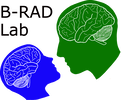Prospective Graduate Students
Dr. Hudac WILL be taking graduate students during the Fall 2023 application cycle at the University of South Carolina. Priority will be given to students interested in the Cognitive & Neural Sciences (CNS) Program and potentially the Behavioral-Biomedical Interface Program (BBIP). There is a slight possibility of taking a student in the Clinical-Community Program, particularly if enrolled in BBIP. However, the B-RAD Lab will be prioritizing CNS applicants.
Special notes for applying :
See our Research page and reach out to Dr. Hudac for more information about specific projects. All projects are collaborations between Dr. Hudac, B-RAD members, and our collaborators. As an update for 2023-2024, students may be involved in the following projects:
We are currently pretty busy with our existing projects and are looking for help on these projects! However, we look forward to working with new graduate students to extend upon these projects and try asking new research questions as well. Dr. Hudac firmly believes in learning about science from "head to toe", so prospective graduate students can anticipate in-depth training at all research stages (development, creation, collection, analysis, dissemination).
What are you looking for in a prospective graduate student?
Competitive students to our UofSC program will likely have previous experience within research labs, including some independent research (e.g., honors thesis, conference poster). Evidence of strong writing is also a common factor in acceptance decisions, so be sure that your personal statement articulates your ideas, experiences, and goals. Here are some additional factors that may suggest success within the B-RAD Lab.
Special notes for applying :
- Review deadlines and requirements
- Applications are due December 1, 2023
- We encourage you to contact Dr. Hudac and current students to learn more about the lab! Don't be shy - shoot us an email!
- Make sure that your personal statement addresses these aspects:
- Why are you prepared for graduate study?
- Describe your writing and quantitative skills
- How have you handled past challenges?
- What do you want to study (e.g., your research interests)?
- Why do you want to work with Dr. Hudac and the B-RAD Lab?
See our Research page and reach out to Dr. Hudac for more information about specific projects. All projects are collaborations between Dr. Hudac, B-RAD members, and our collaborators. As an update for 2023-2024, students may be involved in the following projects:
- We anticipate starting a new longitudinal study (R01) focusing on the link between social connection and well-being in neurotypical adolescents using surveys and daily diaries, as well as simultaneous EEG/ET. We plan to extend parts of this project to autism in the future.
- We will be completing data collection on our R15 study targeting social attention using EEG/ET during Summer 2023. Students would have an opportunity to use collected data for publications and presentations.
- As part of the BioGENE study, we will continue to collect data from rare genetic groups and are pushing on natural history studies of the brain in these genetic groups, autistic samples (with and without profound autism), and comparisons groups. We will be extending this work using longitudinal methods and adding an intersection with sleep.
We are currently pretty busy with our existing projects and are looking for help on these projects! However, we look forward to working with new graduate students to extend upon these projects and try asking new research questions as well. Dr. Hudac firmly believes in learning about science from "head to toe", so prospective graduate students can anticipate in-depth training at all research stages (development, creation, collection, analysis, dissemination).
What are you looking for in a prospective graduate student?
Competitive students to our UofSC program will likely have previous experience within research labs, including some independent research (e.g., honors thesis, conference poster). Evidence of strong writing is also a common factor in acceptance decisions, so be sure that your personal statement articulates your ideas, experiences, and goals. Here are some additional factors that may suggest success within the B-RAD Lab.
- Interest in the brain: The B-RAD prefers to take students with a specific objective to study brain mechanisms, thus, having experience with cognitive neuroscience methods is also preferable. However, that is NOT a "deal-breaker" -- we do a substantial amount of training to ensure that our Ph.D. and undergraduate interns all train in theory, method execution, and analysis.
- Experience with children: Because we work closely with infants, children, and adolescents (with and without neurodevelopmental disorders), strong applicants will demonstrate real-world experiences with children.
- Overlap in scientific research questions: Make sure that your personal statement describes what topics you would like to study and what questions would be your focus. The B-RAD Lab investigates a fairly wide range of topics, so please describe how your chosen area fits with (or relates to) our existing projects.
